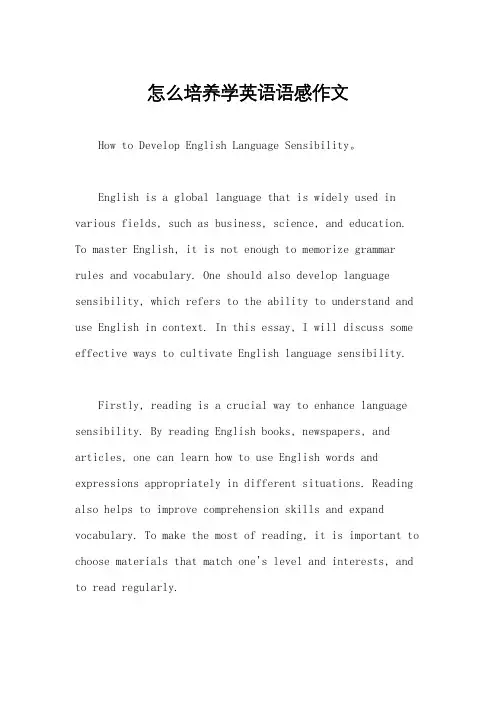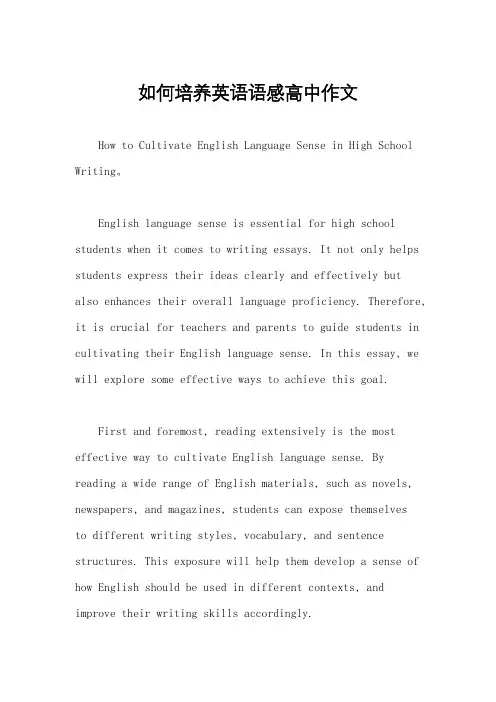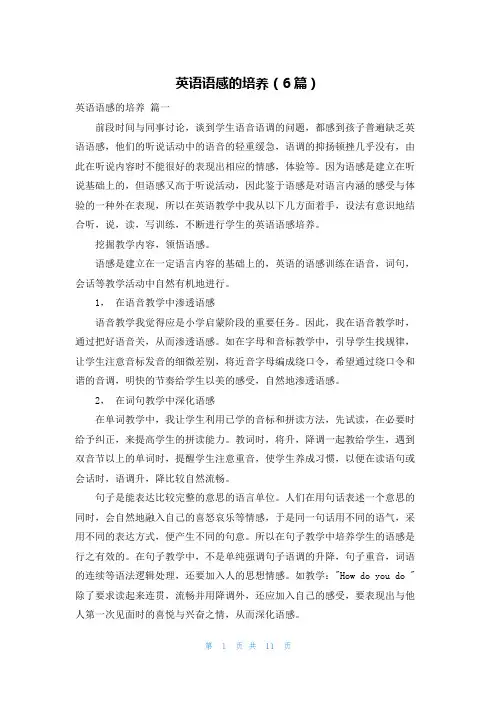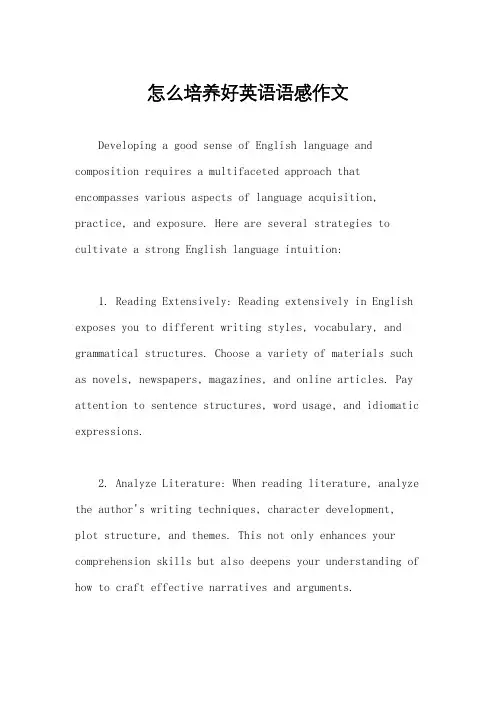英语论文:浅谈如何有效培养学生的英语语感
- 格式:doc
- 大小:25.50 KB
- 文档页数:2

怎么培养学英语语感作文How to Develop English Language Sensibility。
English is a global language that is widely used in various fields, such as business, science, and education. To master English, it is not enough to memorize grammar rules and vocabulary. One should also develop language sensibility, which refers to the ability to understand and use English in context. In this essay, I will discuss some effective ways to cultivate English language sensibility.Firstly, reading is a crucial way to enhance language sensibility. By reading English books, newspapers, and articles, one can learn how to use English words and expressions appropriately in different situations. Reading also helps to improve comprehension skills and expand vocabulary. To make the most of reading, it is important to choose materials that match one's level and interests, and to read regularly.Secondly, listening and speaking are equally important in developing language sensibility. Listening to English podcasts, music, and movies can help one get used to different accents and intonations, and understand how English is used in daily conversations. Speaking English with native speakers or language partners can also help improve pronunciation, fluency, and confidence in using English. It is important to practice regularly, even if it means speaking to oneself or recording one's voice.Thirdly, writing is another way to cultivate language sensibility. By writing in English, one can learn how to express ideas clearly and logically, and use appropriate grammar and vocabulary. Writing can also help to improve spelling and punctuation skills. To practice writing, one can start by keeping a diary, writing emails, or participating in online forums.Lastly, immersing oneself in an English-speaking environment can greatly enhance language sensibility. This can be done by traveling to English-speaking countries, attending English classes or workshops, or participating inEnglish-speaking communities. Immersion helps one get used to the language and culture, and learn how to use English naturally and appropriately.In conclusion, developing English language sensibility requires a combination of reading, listening, speaking, writing, and immersion. By practicing these skills regularly and consistently, one can improve their ability to understand and use English in context, and become more confident and proficient in the language.。

浅谈初中英语教学中对学生英语语感的培养语感是指人们对语言的一种敏锐感知和把握能力。
在英语学习中,培养学生的英语语感是非常重要的,它不仅可以提高学生的语言表达能力,还可以让学生更好地理解和运用英语。
那么,在初中英语教学中,如何培养学生的英语语感呢?下面就浅谈一下这个问题。
提倡多听多说。
语言是用来交流的工具,只有通过多听多说,学生才能真正地掌握英语。
在课堂教学中,教师可以多播放一些英语听力材料,让学生进行听力训练和模仿,从而提高学生的英语语感。
教师还可以组织一些英语口语活动,让学生多进行口语表达,培养他们的语感和表达能力。
注重语境的营造。
语言是在一定的语境中产生和发展的,只有理解了语言所处的语境,学生才能更好地掌握语言。
在英语教学中,教师可以通过情景创设和教材内容,让学生在真实的语境中学习和理解英语,从而培养学生的英语语感。
通过引导学生观看英语影视剧、阅读英语故事等方式,让学生感受到英语所处的真实语境,从而提高他们的语感和理解能力。
注重课文的感悟。
课文是学生学习英语的重要载体,通过课文的学习和感悟,可以培养学生的英语语感。
教师可以引导学生通过朗读、背诵等方式深入理解课文,体会其中的语言韵律和表达方式,从而提高学生的英语语感。
教师还可以通过课堂讲解和讨论,引导学生深入理解课文,培养他们的语感和思维能力。
注重语言表达的训练。
语感的培养离不开语言表达的训练,只有经过不断地语言表达,学生才能更好地掌握英语。
在英语教学中,教师可以通过各种形式的写作训练,让学生多进行语言表达,从而提高他们的英语语感。
教师还可以通过批改作文、指导写作等方式,帮助学生提高语言表达能力,培养他们的语感。

谈谈如何培养学生英语语感开发区第一小学刘晓莲摘要:英语的语感对英语教学和英语的运用起着重要作用。
通过引导学生反复地进展听、说、读、写训练,帮助小学生掌握英语的言语技能,培养他们运用英语进展交际,从而使他们获得良好的英语语感。
关键词:英语语感英语是一门用于交际的语言,是一门理论性很强的学科。
小学阶段英语教学的目的是培养学生学习英语的习惯,激发学生学习英语的兴趣,在起始阶段打下良好的根底,培养学生学习英语的积极性,使他们树立学习英语的自信心。
多听、多说、多读是获得语言材料、积累语言知识的有效途径,也就是一个培养语感的过程。
英语语感是人们对英语语言的感觉,它包括人们对英语的语音感受、语意感受、语言情感色彩的感受等。
人们在语言运用中有时感到看起来顺眼、听起来顺耳、说起来顺口,但又说不清其原因,这实际上就是语感在起作用。
作为英语老师,走进教室就应该讲英语,借助于自己的气势、眼神、音调、动作等辅助手段,让学生专心听,学着去说。
这样,长期坚持下去,学生的耳朵就会越来越活,嘴巴就会越来越顺,相应地,学生的语感也就得到加强了。
下面,结合本人的教学理论,谈谈自己对培养学生英语语感的点滴体会。
一、解决听的问题是培养语感的第一步1、字词的听力训练要让孩子的耳朵灵起来,就必须经常性地对他们的耳朵进展频繁而密集式地刺激。
这一点始终贯穿于我们的课堂教学和课前课后的浸透中。
通过声音的刺激,让孩子先感觉并辅以实物、图片等详细形象的教具来激发他们的视觉感受,做到耳到眼到以到达耳闻不忘的目的。
比方我在教授?开心学英语?第6册unit 9的 sounds and words 的单词时,先让学生听别人朗读单词,再出示单词图片,用标准、明晰的声音发出各自的名称两到三次,这样学生的听力和思维也会随之更加敏锐起来。
第一步听的语感根本形成了,再进展说的教学和训练也就不难了。
2、综合听力的训练听英语故事是同学们的意见趋势,也是进展听力综合训练的好方法。

如何培养英语语感高中作文How to Cultivate English Language Sense in High School Writing。
English language sense is essential for high school students when it comes to writing essays. It not only helps students express their ideas clearly and effectively but also enhances their overall language proficiency. Therefore, it is crucial for teachers and parents to guide students in cultivating their English language sense. In this essay, we will explore some effective ways to achieve this goal.First and foremost, reading extensively is the most effective way to cultivate English language sense. By reading a wide range of English materials, such as novels, newspapers, and magazines, students can expose themselvesto different writing styles, vocabulary, and sentence structures. This exposure will help them develop a sense of how English should be used in different contexts, and improve their writing skills accordingly.Secondly, practicing writing regularly is another key to cultivating English language sense. Writing essays, reports, and even diary entries on a regular basis can help students become more familiar with the language and gain confidence in expressing themselves in English. Teachers can assign writing tasks that encourage students to use a variety of vocabulary and sentence structures, and provide feedback to help them improve their writing skills.In addition to reading and writing, listening to English podcasts, watching English movies, andparticipating in English-speaking activities can also help students cultivate their English language sense. By listening to native speakers and engaging in conversations in English, students can improve their listening and speaking skills, as well as develop a better understanding of English language use in real-life situations.Furthermore, using English language learning apps and websites can also be beneficial for high school students. These resources provide interactive exercises, quizzes, andgames that can help students practice their English language skills in a fun and engaging way. By using these tools, students can reinforce what they have learned in the classroom and improve their English language sense.In conclusion, cultivating English language sense is essential for high school students to become proficient writers. By reading extensively, practicing writing regularly, listening to English materials, and using language learning resources, students can enhance their language skills and develop a better understanding of how English should be used. With the guidance and support of teachers and parents, high school students can cultivate their English language sense and become confident and effective writers.。

英语语感的培养(6篇)英语语感的培养篇一前段时间与同事讨论,谈到学生语音语调的问题,都感到孩子普遍缺乏英语语感,他们的听说话动中的语音的轻重缓急,语调的抑扬顿挫几乎没有,由此在听说内容时不能很好的表现出相应的情感,体验等。
因为语感是建立在听说基础上的,但语感又高于听说活动,因此鉴于语感是对语言内涵的感受与体验的一种外在表现,所以在英语教学中我从以下几方面着手,设法有意识地结合听,说,读,写训练,不断进行学生的英语语感培养。
挖掘教学内容,领悟语感。
语感是建立在一定语言内容的基础上的,英语的语感训练在语音,词句,会话等教学活动中自然有机地进行。
1,在语音教学中渗透语感语音教学我觉得应是小学启蒙阶段的重要任务。
因此,我在语音教学时,通过把好语音关,从而渗透语感。
如在字母和音标教学中,引导学生找规律,让学生注意音标发音的细微差别,将近音字母编成绕口令,希望通过绕口令和谐的音调,明快的节奏给学生以美的感受,自然地渗透语感。
2,在词句教学中深化语感在单词教学中,我让学生利用已学的音标和拼读方法,先试读,在必要时给予纠正,来提高学生的拼读能力。
教词时,将升,降调一起教给学生,遇到双音节以上的单词时,提醒学生注意重音,使学生养成习惯,以便在读语句或会话时,语调升,降比较自然流畅。
句子是能表达比较完整的意思的语言单位。
人们在用句话表述一个意思的同时,会自然地融入自己的喜怒哀乐等情感,于是同一句话用不同的语气,采用不同的表达方式,便产生不同的句意。
所以在句子教学中培养学生的语感是行之有效的。
在句子教学中,不是单纯强调句子语调的升降,句子重音,词语的连续等语法逻辑处理,还要加入人的思想情感。
如教学:"How do you do "除了要求读起来连贯,流畅并用降调外,还应加入自己的感受,要表现出与他人第一次见面时的喜悦与兴奋之情,从而深化语感。
3,在会话教学中提高语感语言是交际的工具,外语教学的目的要培养学生创造性地,有目的地运用外语进行交际的能力。

英语(心得)之浅谈如何有效培养学生的英语语感英语论文之浅谈如何有效培育同学的英语语感英语语感是人们对英语语言的直接感知力量,是人们对英语语言法则或语言组织方法的把握和运用,是反复从感性熟悉上升为理性熟悉的阅历和体会。
英语语感的培育不能一蹴而就,由于英语学问、生活阅历、思维成果的积累,是一个长期的过程,所以我们必需从学校生学英语的那天起就要有意识地急躁培育,逐步提高要求,以达到我们的教学目的。
如何培育学校生的英语语感呢?以下就本人教学中的实践阅历和思索,略陈拙见。
一。
创设直观的听说环境,从感性熟悉入手增加语感让孩子做父母的小老师语感对英语学习特别重要,但语感不行能在短时间内培育出来,需要通过一段较长时间的训练才能渐渐获得。
老师在教学的各个环节中都应将详细的教学任务与培育同学的语感联系起来。
如在低班级,可从最初的简笔画教授单词,同学感爱好,会仔细倾听,这时准时教授读音,同学听读后,要求同学读画所教的词,并教会父母,这样就给孩子制造了说英语的环境,随着孩子的提高,渐渐将句子融入画里,不断丰富画的内容,然后让孩子配上英语句子,这样循序渐进的,孩子们的英语在不知不觉中有了肯定的基础。
1)坚持用英语授课任何一门技巧的入门都是从仿照开头的。
我们常常发觉,某些同学说话的语气、语调跟老师如出一辙,这就是长期“语言同化”的结果。
所以作为英语老师,对自己的英语口语耍有严格的要求,课堂上坚持以清楚明快、抑扬顿挫的英语口语给同学鲜活、生动的语言示范,使同学享受到良好的语言熏陶。
2)组织各种听说活动充分借助现代化教学手段和学校有外教的优势开展师生双边活动,在学校设立英语角,让孩子有机会常常和外教沟通,同时,应用录音机、投影机、语音室、多媒体教室创设形象生动的英语听说情景。
上课时还可以通过英语值日生做汇报,看图说话,复述课文,争论问题等多种形式,尽量制造条件让同学多听多说,增加同学接触英语,感受英语的机会。
3)乐观开展课外活动要培育一种力量,光靠课内4O分钟是不够的,应开展丰富多彩的英语课外活动如鼓舞同学课外多听课文录音、英美人士朗读的磁带;定期收看英语电视节目;课间,同学之间,师生之间交谈尽量用英语进行;开通英语之声校内广播,开拓校内英语园地黑板报,以及进行英语节目及朗诵竞赛等等,让同学在轻松开心的听说氛围中,渐渐感知、仿照语言,不知不觉中增加自己的语感。

浅谈初中英语教学中对学生英语语感的培养
初中英语教学中对学生英语语感的培养是非常重要的。
英语语感是指学生对英语语音、语调、语法、词汇和句型等方面的感觉和理解能力。
培养学生的英语语感可以提高学生的
口语和听力能力,同时也有助于学习英语的兴趣和自信心的建立。
下面将从课堂教学和课
外学习两个方面来探讨如何培养学生的英语语感。
在课堂教学中,老师应该注重培养学生的听说能力。
通过多听多说的方式,让学生在
真实语境中感受到英语的魅力。
老师可以用情境对话、角色扮演等活动来帮助学生运用所
学的知识进行交流。
老师也应该注意语音、语调的教学。
培养学生对英语语音的敏感性和
准确性,可以通过歌曲、朗诵等方式来加强学生的语音训练。
老师还可以通过影视剧和音
频教材等资源来让学生听到正宗的英语口语。
课外学习也是培养学生英语语感的重要途径。
学生可以通过多听英语广播、看英语电影、听英语音乐来扩大对英语语境的感知。
学生还可以参加英语角、英语俱乐部等活动,
与其他学生一起交流和练习英语,提高口语表达的能力。
学生还可以通过做英语练习题,
多读英语文章,积累词汇和句型,提升自己的语法水平。
除了课堂教学和课外学习,还可以通过一些趣味活动来培养学生的英语语感。
可以组
织一些英语竞赛或英语演讲比赛,让学生展示自己的英语能力,增强学生学习英语的积极
性和自信心。
老师还可以设计一些趣味课堂活动,如英语游戏、英语歌曲欣赏等,让学生
在轻松愉快的氛围中学习英语。

浅谈初中英语教学中对学生英语语感的培养
首先,注重英语语音、语调的训练。
英语是一门重视语音语调的语言,学生要想在听
说中表现自如,必须掌握准确、自然的英语发音和语调节奏。
我们可以通过反复朗读、模
仿native speaker、听力训练等多种方法来提高学生的英语口语表达能力和英语语感。
其次,注重英语阅读、听力的培养。
除了课堂教学,我们还可以通过多种途径让学生
接触到英语,比如给学生布置家庭作业、推荐英语电影、英文小说或听力材料,还可以引
导学生自己主动查阅英语信息。
这样,可以让学生不断接触英语,加深对英文的理解和感知。
再次,注重培养学生的语感鉴赏能力。
学生在接触更多的英文作品的同时,也应该学
会如何欣赏和理解他人的语言表达。
学生可以学习如何分析文本中的词汇、句子和篇章结
构以及作者对某个主题的表达方式。
逐渐地,学生就能够领会到英语中的独特韵味和特点,提高英语语感的感知力。
最后,注重培养学生的创新能力。
培养学生的英语语感不仅是对英文的认识和理解,
更应该是学生自身的思想、理念和创意的发掘和表达。
教师可以引导学生思考,鼓励他们
自主创作英语作文,用英语写日记或短诗等,通过写作等形式来增强学生的创新能力和表
达能力。
总之,培养学生的英语语感需要花费一定的时间和精力,而且需要采用各种灵活多变
的方法和手段。
只有持之以恒地从多个方面引导学生,才能够充分展现英语学习的魅力和
内涵,终得走向成功的路上。

浅谈如何在英语教学中培养学生良好的语感如何在英语教学中培养学生良好的语感?语感是指一种细微而深刻的语言灵敏度,它让人感受到语言的韵律、美感、情感和音乐特点。
在英语教学中,培养学生良好的语感,可以让学生更加自然流畅地表达英语,延伸学生的文化视野和世界观,提高英语学习的乐趣与兴趣,也是英语教学的重要目标之一。
那么,如何培养学生良好的语感呢?一、注重英语听力训练作为外语学习,在英语学习中,听力是至关重要的。
学生在听力训练中,可以通过多听、多说、多模仿来培养好的语感。
多听可以让学生更好地感受英语的韵律和语音特点,还能帮助学生拓宽自己的语音库,尤其是句型的应用和非母语表达中的语音现象;多说可以让学生熟练使用英语发音和语音,保证口齿清晰、语调准确;多模仿可以让学生更好地领悟英语的语感,模仿音频中的语音、韵律、声调,从而不断积累自己的英语表达能力,尤其是说话的速度、语调、节奏和停顿。
二、重视英语阅读和写作的训练阅读和写作作为语言能力的重要方面,不仅帮助学生熟悉英语的语言结构和词汇,而且还可以加强学生的语感训练。
阅读可以让学生更好地感受英语的语音、语调和语法,同时还可以锻炼学生的阅读速度和理解能力,是增强学生语感的重要手段;写作则是培养学生英语表达和思维能力的好方式。
通过写作,学生不仅可以锻炼自己的语言表达,还能逐渐提高自己的语感和语言思维能力。
可以对于学生进行写作指导,帮助学生梳理好文章结构,提高句型表达能力和文章语感。
三、传授语感的构成方式1.词汇语感词汇是语言的基础单元,良好的词汇积累和善于搭配,是培养好的语感的先决条件。
其中,词汇的语感构建包括如何寻找同义词、同时对于小单元的词缀词根的处理方法。
2.句子语感句子语感的构建需要学习者对于英语的语法知识的掌握及语言的节奏感、语调感、重音和音高、断句与停顿的运用。
同时,在学习中鼓励学生提出个人喜爱的课文或音频,并且鼓励其尝试模仿,可以充分的激发学生应用语感知识的偏爱。

初中英语教学中如何培养学生的语感
语感是人们对语言的领悟感应能力,是语言训练达到一定水平的表现。
叶圣陶先生曾说过:“在语言教学中,语感是听说读写四种能力中最核心的因素。
离开了语感,文学作品无从欣赏,听说读写能力无从起;语感的水平决定着听说读写的水平。
” 英语语感是人们对英语语言的感觉,它包括人们对英语的语音感受、语意感受、语言情感色彩的感受等。
它是人们对英语语言的直接感知能力,是人们对英语语言法则或语言组织方法的掌握和运用,是感性认识上升为理性认识的经验和体会。
语感来自于语言实践,又指导语言实践,正如球类运动员要打好球必须熟悉球性,游泳运动员要有良好的水性,搞音乐的人要有良好的乐感一样,要学好用好英语,就应该具备良好的语感。
对以英语为外语的中国学生来说,培养好的语感无疑是最有效的方法。
那么,如何培养学生的语感呢?
一、在多听中形成语感
教材中的听力训练、对话和课文都配有由英美人士示范朗读的录音磁带,这是学生感知语感的首选。
教师要充分利用这些音像材料,最大限度地让学生多听、多感受、多模仿,使学生充分感知标准的语音、语调、意群停顿、句子重音和节奏语气等,建立声音图示记忆,从而形成英语语感的第一性感觉。
在课堂上,教师尽量使用课堂习惯用语。
课堂教学中可以使用的日常用语十分广泛,只要教师灵活地、恰如其分地运用,就会收到很好的效果。
尽可能多地使用如下用语,就更能体现出课堂中的。

怎么培养好英语语感作文Developing a good sense of English language and composition requires a multifaceted approach that encompasses various aspects of language acquisition, practice, and exposure. Here are several strategies to cultivate a strong English language intuition:1. Reading Extensively: Reading extensively in English exposes you to different writing styles, vocabulary, and grammatical structures. Choose a variety of materials such as novels, newspapers, magazines, and online articles. Pay attention to sentence structures, word usage, and idiomatic expressions.2. Analyze Literature: When reading literature, analyze the author's writing techniques, character development,plot structure, and themes. This not only enhances your comprehension skills but also deepens your understanding of how to craft effective narratives and arguments.3. Writing Practice: Regular writing practice is essential for honing your English language skills. Start with short essays, journal entries, or reflections on various topics. Gradually increase the complexity and length of your compositions. Experiment with different writing styles and genres to broaden your repertoire.4. Receive Feedback: Seek feedback from teachers, tutors, or language exchange partners to identify areas for improvement in your writing. Constructive criticism helps you identify recurring errors, refine your writing style, and expand your vocabulary.5. Imitation Exercise: Choose well-written passages or essays and analyze their structure, tone, and language usage. Then, try to imitate the style and voice of the original author while writing your own compositions. This exercise helps internalize the patterns of English language usage.6. Vocabulary Expansion: Regularly learn new words and phrases to enrich your vocabulary. Use a variety ofresources such as dictionaries, vocabulary books, flashcards, and online platforms. Incorporate newly acquired words into your writing to reinforce retention and application.7. Grammar and Syntax: Develop a solid understanding of English grammar rules and syntax. Practice sentence construction, punctuation, and grammatical agreement to enhance clarity and coherence in your writing.8. Active Listening and Speaking: Engage in conversations with native speakers or language partners to improve your listening and speaking skills. Pay attention to intonation, pronunciation, and colloquial expressions. Actively participate in discussions, debates, or public speaking events to build confidence and fluency.9. Revision and Editing: Review and revise your written work to refine your ideas, structure, and language usage. Focus on clarity, coherence, and conciseness. Pay attention to grammar, spelling, and punctuation errors. Editing is an integral part of the writing process that helps polish yourcompositions to a high standard.10. Cultural Immersion: Immerse yourself in English-speaking environments through cultural activities, films, music, and social interactions. This exposure enhances your cultural understanding, fosters empathy, and facilitates language acquisition in authentic contexts.By incorporating these strategies into your learning routine and maintaining a consistent practice regimen, you can cultivate a strong English language intuition and improve your writing skills over time. Remember that progress takes time and perseverance, so stay committed to your language learning journey.。
浅谈初中英语教学中对学生英语语感的培养随着全球化的发展和国际交流的日益频繁,英语已经成为了一门不可或缺的语言。
在中国,英语教育一直占据着重要的地位,而初中阶段是学生英语学习的关键时期。
在这个阶段,学生不仅需要掌握基本的语法和词汇,更需要培养良好的英语语感。
那么,如何在初中英语教学中培养学生的英语语感呢?本文将就此进行探讨。
培养学生的英语语感需要创设良好的语言环境。
语言是活的,只有在真实的语言环境中才能更好地感受和理解语言。
教师在课堂上应该营造各种情景和活动,让学生在实践中感悟语言的含义和用法。
通过角色扮演、小组讨论、英语歌曲、朗读比赛等方式,让学生在轻松愉快的氛围中感受语言的魅力,从而潜移默化地培养英语语感。
培养学生的英语语感需要注重听力和口语训练。
语感是建立在对语音、语调和语言节奏的敏感和把握之上的,因此培养学生的英语语感必须从听力和口语训练入手。
教师可以通过各种听力材料和口语练习,让学生不断地接触和模仿地道的英语语音和语调,激发学生的学习兴趣,提高他们对英语语言的敏感度和感知能力。
培养学生的英语语感需要注重阅读和写作训练。
阅读扩展了学生的语言知识面,写作提高了学生的语言表达能力,这对培养学生的语感至关重要。
教师可以通过精心挑选的英文读物和写作任务,引导学生从阅读中感受语言的美感和表达力,从写作中培养语言的表达能力和感知能力,提高学生的整体语感和文字素养。
培养学生的英语语感需要结合跨学科知识。
语感是一种综合能力,它不仅仅是对语法和词汇的掌握,更需要结合各种背景知识和文化意识。
在英语教学中,教师应该通过跨学科的教学方式,引导学生深入了解英语国家的地理、历史、文化等知识,让学生在语境中理解和感受英语语言的内涵和魅力,从而提高他们的英语语感。
初中英语教学中对学生英语语感的培养是一个系统工程,需要教师以及学校、家长的共同努力。
通过创设良好的语言环境,注重听力和口语训练,重视阅读和写作训练,结合跨学科知识等方式,共同培养学生的英语语感,从而提高他们的英语综合能力和语言素养。
学生如何培养英语语感作文As we all know, having a good sense of language is essential for learning English. But how can we cultivate this sense of language? Here are some tips for students to develop their English language skills.Firstly, reading is an important way to develop language sense. Reading English books, newspapers, and magazines can help students to learn new words, phrases, and sentence structures. They can also learn how to use English in different contexts, which can improve their communication skills.Secondly, listening to English is also crucial for developing language sense. Students can listen to English songs, watch English movies and TV shows, and even listen to English podcasts. This can help them to become familiar with different accents, intonations, and pronunciation, which can improve their listening and speaking skills.Thirdly, speaking English as much as possible is essential for developing language sense. Students can practice speaking English with their classmates, friends, and teachers. They can also participate in English clubs or activities, such as debating clubs, drama clubs, or English conversation clubs. This can help them to improve their fluency, accuracy, and confidence in using English.Fourthly, writing in English can also help students to develop language sense. Students can write essays, journals, or even emails in English. This can help them to practice using different writing styles, structures, and expressions, which can improve their writing skills.Finally, having a positive attitude towards learning English is also important for developing language sense. Students should enjoy learning English and be willing to take risks and make mistakes. They should also be patient and persistent in their efforts to improve their language skills.In conclusion, developing language sense is essentialfor learning English. By reading, listening, speaking, writing, and having a positive attitude towards learning, students can cultivate their language sense and become proficient English speakers.。
浅谈如何在英语教学中培养学生良好的语感How to Cultivate Students' Good Sense of Language in English TeachingIntroductionAs English language learning becomes more important in today's globalized world, it is crucial for educators to focus not only on grammar and vocabulary but also on cultivating students' good sense of language. A good sense of language refers to a student's ability to understand and use language effectively and accurately. It involves aspects such as pronunciation, intonation, vocabulary usage, idiomatic expressions, and linguistic creativity. In this article, we will delve into the methods and strategies that can be employed in English teaching to foster a strong sense of language in students.1. Providing Extensive Exposure to EnglishOne of the most effective ways to develop a good sense of language is by creating an English-rich environment both inside and outside the classroom. Teachers can expose students to a wide variety of English materials, such as books, magazines, newspapers, movies, songs, and podcasts. This exposure helps students to develop an ear for the language's natural flow, rhythm, and intonation. Moreover, teachers can organize language activities, discussions, and debates to encourage students to use English in authentic and meaningful contexts.2. Teaching Pronunciation and Intonation SkillsTo develop students' listening and speaking skills, pronunciation and intonation play a vital role. Teachers should pay attention to teaching proper pronunciation and intonation, helping students become aware of the sounds and patterns of English. Phonics exercises can be used to develop sound discrimination and repetition skills, while tongue twisters, rhymes, and rhythm exercises can improve students' intonation and stress patterns. Regularly practicing pronunciation and intonation will eventually lead to the enhancement of students' overall language competence.3. Promoting Vocabulary Enrichment and UsageA rich vocabulary is essential for effective language use. Teachers can adopt various strategies to foster vocabulary development. Firstly, they can introduce new words through context and encourage students to use dictionaries or online resources for word meanings and examples. Vocabulary games, such as word puzzles, crosswords, and word association tasks, can be used to make vocabulary learning fun and engaging. Moreover, encouraging students to use newly learned words in speaking and writing activities will further reinforce their understanding and retention.4. Encouraging Reading and Literature AppreciationReading is an indispensable way to cultivate language sense. By exposing students to diverse genres of literature, teachers can nurture students' love for reading while simultaneously building their English language skills. Teachers can introduce graded readers, short stories, and novels appropriate for differentproficiency levels. Classroom discussions and activities related to the readings can enable students to engage with the content, explore different use of language, and increase their understanding of cultural nuances.5. Expanding Idiomatic and Colloquial ExpressionsIdioms and colloquial expressions are intrinsic to native-like language use. A student with a good sense of language should be able to grasp the appropriate meaning and usage of idiomatic expressions. Teachers can incorporate idioms and colloquial phrases into their English lessons, providing explanations, examples, and meaningful contexts for students to understand their usage. Additionally, interactive games, role-plays, and storytelling can be utilized to reinforce the comprehension and application of idiomatic expressions.6. Fostering Linguistic CreativityTo develop students' linguistic creativity, teachers should encourage them to think beyond the boundaries of literal interpretation. Writing prompts, creative projects, and debates can prompt students to express their ideas using imaginative and metaphorical language. By encouraging students to experiment with language and express themselves creatively, teachers help cultivate a strong sense of language in students.ConclusionCultivating students' good sense of language is a multifacetedendeavor that requires a holistic approach in English teaching. By exposing students to a wide array of English materials, teaching pronunciation and intonation skills, promoting vocabulary enrichment and usage, encouraging reading and literature appreciation, expanding idiomatic and colloquial expressions, and fostering linguistic creativity, teachers can effectively nurture students' language sense. A strong sense of language not only enhances students' communicative abilities but also fosters their appreciation of the beauty and richness of the English language.。
学生英语语感的培养论文英语语感是指英语的掌握程度无限接近母语水平,可灵活的使用流利的、纯正的英语表达所思所想,形成本能的、条件反射式的思维方式,让语言回归于实际生活应用。
下面是小编精心整理的学生英语语感的培养论文,希望对你有帮助!学生英语语感的培养论文篇1摘要:本文从夯实基础、创设英语语境、增大学生的积累量、了解中西方文化差异四个方面阐述了如何培养学生的英语语感,目的在于提高学生的英语综合能力。
关键词:英语语感;培养;教学法进入21世纪,社会日益信息化,经济全球化,这使得作为重要信息载体的英语成为人类生活各个领域中使用最广泛的语言,而要提高学生的英语水平,英语语感起着非常重要的作用。
语感就是人们对语言的领悟能力,是语言训练到熟能生巧的表现。
语感是一种看不见,摸不到的东西,但它确实存在着,并在英语的学习中起着积极的作用。
有效的培养语感,会加速语感的早日形成和优化。
下面笔者从几个方面谈谈如何培养中学生的英语语感。
一、夯实基础是英语语感的前提1.语音教学,渗透语感。
英语与其它任何一门语言一样,都有着自己独特的语音和语调,如果我们细心感受就会发现它有一种韵律美。
在教学中,元音有长短音,所以读起来要有抑和扬的反差,而辅音连缀和爆破使辅音连读时会失爆,所以一定要读得一泻而下,要使学生听起来感到流畅和潇洒。
重音、多音节的单词有重读音节,有时还有一个次重读音节,这样就显出了抑扬和强弱。
英语的句子也一样:动词、名词、形容词、副词、数词等实词通常要重读,其它的虚词如冠词、介词、代词等一般要轻读,这样句子的节奏就读出来了。
所以教师在语音训练时一定要富有节奏地,有声有色地朗读,学生就会自然而然地形成一种英语语感。
2.词汇教学,深化语感。
单词是英语学习的基础。
掌握了单词,才有可能准确地表达个人在交际时的真实想法。
所以单词的教学是培养语感的关键所在。
首先,教师要认真地讲解每一个单词,并让学生对单词有一个整体的认知,当然我们可以利用一切可以利用的资源,如声音、图像、肢体语言等使学生对单词的学习简单化,从而达到快速、深刻地记忆单词。
如何培养英语语感作文How to Cultivate English Language Intuition。
As we all know, having a good sense of language is essential for mastering a foreign language. In the case of English, having a strong English language intuition can greatly improve one's ability to communicate effectively and understand the language more deeply. So, how can one cultivate their English language intuition? Here are some effective ways to do so.First and foremost, reading is one of the mosteffective ways to cultivate English language intuition. By reading widely and regularly, one can expose themselves to a variety of vocabulary, sentence structures, and writing styles. This exposure can help to develop a natural feelfor the language and improve one's ability to use it fluently and accurately. Reading a variety of materials, such as novels, newspapers, and magazines, can also help to broaden one's understanding of the language and its usagein different contexts.In addition to reading, listening to English audio materials, such as podcasts, radio programs, and audiobooks, can also help to cultivate English language intuition. By listening to native speakers and paying attention to their pronunciation, intonation, and rhythm, one can develop a better understanding of the language's natural flow and cadence. This can help to improve one's ability to speakand comprehend English more naturally and fluently.Another effective way to cultivate English language intuition is to practice speaking and writing regularly. By engaging in conversations with native speakers or language partners, one can improve their ability to use the language in real-life situations and gain a better understanding of its nuances and subtleties. Similarly, writing regularly, such as keeping a journal or writing essays, can help to improve one's ability to express themselves clearly and effectively in English.Furthermore, immersing oneself in the English languageand culture can also help to cultivate English language intuition. This can be done by watching English-language movies and TV shows, listening to English-language music, and participating in English-language activities and events. By exposing oneself to the language and culture in this way, one can gain a deeper understanding of the language and its usage in different contexts.In conclusion, cultivating English language intuitionis essential for mastering the language and becoming a more effective communicator. By reading widely, listening to English audio materials, practicing speaking and writing regularly, and immersing oneself in the language and culture, one can develop a natural feel for the languageand improve their ability to use it fluently and accurately. With dedication and effort, anyone can cultivate their English language intuition and become a more proficient English speaker.。
浅析高中英语教学中如何培养学生的语感论文
浅析高中英语教学中如何培养学生的语感全文如下:
一、创设地道英语环境,提高语感
二、重视朗读训练,增强语感
书读百遍,其义自现。
这句名言不仅适用于读书,也适用于高中英语语感的培养。
对英语经典素材的朗读越多,越有助于学生掌握英语句式的行文结构,越有利于提升学生对英语的敏锐感受力。
而且,朗读一旦达到滚瓜烂熟、熟读成诵的程度,素材中的词语、美句、表达方式便会于无形中化为学生的语言能力,这种能力在学生碰到类似的内容时,会经由一系列的思维活动,帮助学学生得出正确的判断和分析结论。
这一过程可以被理解为举一反三,是语感起作用的直接体现。
熟读成诵、烂记于心是语感形成的重要条件。
第四,限时背诵。
在规定的时间内要求学生熟读并背诵某一段落或一整篇文章,这是朗读的最高境界。
在这些朗读中,学生掌握词句与习惯表达方式,逐步在词句的体味中,提高了英语表达与感悟能力,提升了语感。
三、开展课外实践活动,发展语感
语感的培养仅靠英语课上的短暂的45分钟,显而易见是不足够的。
因此,我们就要开展一些学生喜闻乐见的英语课外实践活动,调动学生学习英语的积极性,并让学生在这些活动中,在实践中进一步发展自己的语感。
浅谈如何有效培养学生的英语语感英语语感是人们对英语语言的直接感知能力,是人们对英语语言法则或语言组织方法的掌握和运用,是反复从感性认识上升为理性认识的经验和体会。
英语语感的培养不能一蹴而就,因为英语知识、生活经验、思维成果的积累,是一个长期的过程,所以我们必须从小学生学英语的那天起就要有意识地耐心培养,逐步提高要求,以达到我们的教学目的。
如何培养小学生的英语语感呢?以下就本人教学中的实践经验和思考,略陈拙见。
一. 创设直观的听说环境,从感性认识入手增强语感
让孩子做父母的小老师
语感对英语学习非常重要,但语感不可能在短时间内培养出来,需要通过一段较长时间的训练才能逐渐获得。
教师在教学的各个环节中都应将具体的教学任务与培养学生的语感联系起来。
如在低年级,可从最初的简笔画教授单词,学生感兴趣,会认真聆听,这时及时教授读音,学生听读后,要求学生读画所教的词,并教会父母,这样就给孩子创造了说英语的环境,随着孩子的提高,逐渐将句子融入画里,不断丰富画的内容,然后让孩子配上英语句子,这样循序渐进的,孩子们的英语在不知不觉中有了一定的基础。
1)坚持用英语授课
任何一门技巧的入门都是从模仿开始的。
我们经常发现,某些学生说话的语气、语调跟老师如出一辙,这就是长期“语言同化”的结果。
所以作为英语教师,对自己的英语口语耍有严格的要求,课堂上坚持以清晰明快、抑扬顿挫的英语口语给学生鲜活、生动的语言示范,使学生享受到良好的语言熏陶。
2)组织各种听说活动
充分借助现代化教学手段和学校有外教的优势开展师生双边活动,在学校设立英语角,让孩子有机会经常和外教交流,同时,应用录音机、投影机、语音室、多媒体教室创设形象生动的英语听说情景。
上课时还可以通过英语值日生做汇报,看图说话,复述课文,讨论问题等多种形式,尽量创造条件让学生多听多说,增加学生接触英语,感受英语的机会。
3)积极开展课外活动
要培养一种能力,光靠课内4O分钟是不够的,应开展丰富多彩的英语课外活动:如鼓励学生课外多听课文录音、英美人士朗读的磁带;定期收看英语电视节目;课间,同学之间,师生之间交谈尽量用英语进行;开通英语之声校园广播,开辟校园英语园地黑板报,以及举
行英语节目及朗诵比赛等等,让学生在轻松愉快的听说氛围中,逐渐感知、模仿语言,不知不觉中增强自己的语感。
二、注重朗读训练,习得语感
古人云:“熟读唐诗三百首,不会做诗也会吟”,“书读百遍,其义自见”,这是学习汉语的方法。
对于学好英语,道理是一样的,读得越多,读得越好,文章中的短语、句子、表达方法就会被学生在无意中消化和吸收,从而激发学生的情感,使他们产生对语言文字敏锐的感受力。
1)适时进行语音教学
教学中我们经常发现有学生用汉语或汉语拼音给英语单词注音的现象,学生说出来的英语汉语味很浓,听起来别扭生硬,很不利于学生准确地听说英语,不利于创造英语语境。
教学中,教师可以结合单词教学进行适当的音标教学,运用彩色粉笔分别写出单词中的某一字母或字母组合以及与此相对应的音标,形象地帮助学生把字母与读音联系起来,以加强音形联系。
2)反复进行跟读比较
跟读指跟着示范读,范读可由教师、教学磁带或朗读水平高的学生来朗读,范读时的语气、语调、神态、动作都会给学生留下深刻的印象,反复地跟读比较,可以切实提高学生的朗读水平,达到训练语感的目的。
3)分角色朗读
分角色朗读,不仅可以激发学生的表演欲,也有助于创设真实的会话情景,让学生在实际运用中进一步感受语言,寻找语感。
4)梯度式朗读
朗读训练必须有步骤,分层次,让学生一步一个台阶地练,每一步训练都应有明确的目标,切实做到逐步提高学生的朗读水平,提高语感能力。
总之,语感是一种难以名状,但又实实在在存在着的,非常有用的,对语言的感觉。
教师要充分发挥自己的主观能动性,采取有效措施,有意识地培养学生良好的英语语感。